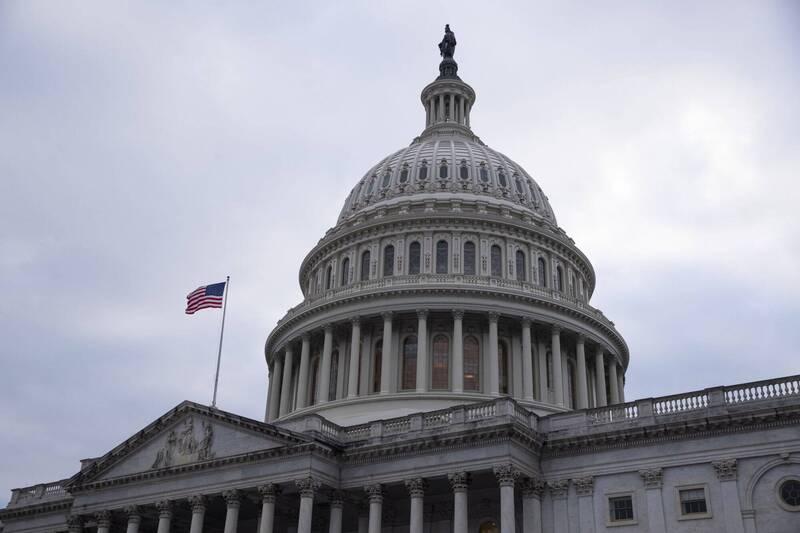The US House of Representatives yesterday passed the US-Taiwan Expedited Double-Tax Relief Act by a 423 to 1 vote.
The act would first exempt taxation for qualifying Taiwanese residents who provide services in the US, and offer a lower withholding tax rate for qualified Taiwanese residents with particular types of US-sourced income such as dividends or interest.
Secondly, the United States-Taiwan Tax Agreement Authorization Act would improve tax cooperation between the two countries, granting the US president authority to negotiate and establish a tax agreement with Taiwan.

Photo: EPA
The bill is to be first sent to the US Senate to vote on before being sent to the US president for his signature to be passed into legislation.
Taiwan has been pushing for a double taxation act in recent years to benefit businesses on both sides of the Pacific.
The act failed to pass in the previous session of the US congress, but yesterday was passed after a second consideration in a new session of congress.
The act “paves the way for increased Taiwanese investment in the U.S. economy,” the New Democrat Coalition of the House said yesterday in a joint statement.
As the US and Taiwan have no formal diplomatic relations, for decades there was previously no tax agreement, forcing individuals to pay taxes to both governments if they live or work in both nations and giving Taiwanese businesses “an excessively high withholding tax when compared to other close trading partners,” the coalition said.
The bill aims to “lower costs on cross-border investment, help expand domestic production of key technologies including chips, and create high-paying jobs in communities across the [US],” it said.
As Taiwan is one of the US’ largest trade partners, the act would “unleash American manufacturing jobs, support [US] semiconductor and chip manufacturing capabilities and secure strategic supply chains, while reducing [US] dependence on China,” House Committee on Ways and Means Chairman Jason Smith said yesterday on X.
Without the agreement, US employees sent to Taiwan for training at semiconductor factories would have to pay double taxes on their income, US House Representative Judy Chu (趙美心) said.
The US has already signed double taxation agreements with more than 60 countries, but due to Taiwan’s unique political position it cannot partake in traditional tax agreements, making Taiwan the only one of the US’ top 10 trade partners without such an agreement, she added.
Taiwanese businesses have expressed to Chu that in the face of large tax bills, they have reduced investment in the US, while a survey conducted by the American Institute in Taiwan (AIT) found that 79 percent of respondents agreed that double taxation was a deterrent to US investments, she said.
In light of the House passing the bill, President William Lai (賴清德) said he hopes that Legislative Speaker Han Kuo-yu (韓國瑜), who is leading a delegation of bipartisan lawmakers to attend the US presidential inauguration of Donald Trump, could celebrate this new milestone in US-Taiwan relations in Washington as Lai met with the delegation at the Presidential Office this morning.

Taiwanese can file complaints with the Tourism Administration to report travel agencies if their activities caused termination of a person’s citizenship, Mainland Affairs Council Minister Chiu Chui-cheng (邱垂正) said yesterday, after a podcaster highlighted a case in which a person’s citizenship was canceled for receiving a single-use Chinese passport to enter Russia. The council is aware of incidents in which people who signed up through Chinese travel agencies for tours of Russia were told they could obtain Russian visas and fast-track border clearance, Chiu told reporters on the sidelines of an event in Taipei. However, the travel agencies actually applied

New measures aimed at making Taiwan more attractive to foreign professionals came into effect this month, the National Development Council said yesterday. Among the changes, international students at Taiwanese universities would be able to work in Taiwan without a work permit in the two years after they graduate, explainer materials provided by the council said. In addition, foreign nationals who graduated from one of the world’s top 200 universities within the past five years can also apply for a two-year open work permit. Previously, those graduates would have needed to apply for a work permit using point-based criteria or have a Taiwanese company

The Shilin District Prosecutors’ Office yesterday indicted two Taiwanese and issued a wanted notice for Pete Liu (劉作虎), founder of Shenzhen-based smartphone manufacturer OnePlus Technology Co (萬普拉斯科技), for allegedly contravening the Act Governing Relations Between the People of the Taiwan Area and the Mainland Area (臺灣地區與大陸地區人民關係條例) by poaching 70 engineers in Taiwan. Liu allegedly traveled to Taiwan at the end of 2014 and met with a Taiwanese man surnamed Lin (林) to discuss establishing a mobile software research and development (R&D) team in Taiwan, prosecutors said. Without approval from the government, Lin, following Liu’s instructions, recruited more than 70 software

Chinese spouse and influencer Guan Guan’s (關關) residency permit has been revoked for repeatedly posting pro-China videos that threaten national security, the National Immigration Agency confirmed today. Guan Guan has said many controversial statements in her videos posted to Douyin (抖音), including “the red flag will soon be painted all over Taiwan” and “Taiwan is an inseparable part of China,” and expressing hope for expedited reunification. The agency last year received multiple reports alleging that Guan Guan had advocated for armed reunification. After verifying the reports, the agency last month issued a notice requiring her to appear and explain her actions. Guan